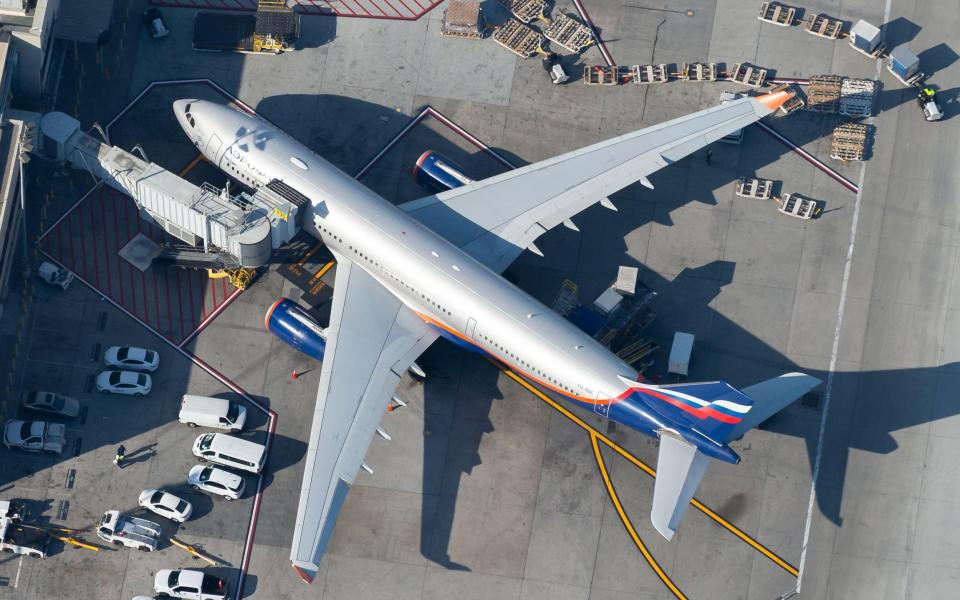Lloyd’s of London ready for £8bn dogfight over planes ‘stolen’ by Putin

Lloyd’s of London is gearing up for a dogfight with the owners of hundreds of aircraft seized by Vladimir Putin’s regime.
The 336-year-old insurance market is understood to have hired law firm Clyde & Co to advise on whether it can “deny” claims against planes worth up to $10bn (£8bn).
The Kremlin is transferring around 500 foreign-owned commercial aircraft to the Russian register to put them out of reach of the leasing companies that own them.
The unilateral move is illegal, according to experts, and amounts to the Russian state “stealing” aircraft owned by leasing companies based in tax-friendly jurisdictions such as Ireland and the Bahamas.
Dublin-based AerCap, the world’s biggest aircraft leasing company, has hired magic circle law firm Clifford Chance to advise on difficult negotiations on claims totalling $3.5bn, according to City sources.
It believes that policies taken out by Russian airlines should cover losses.
Lloyd’s market sources say that negotiations are likely to take years to conclude.
John Neal, Lloyd’s chief executive, conceded in March that the City institution was facing some of its biggest losses since the world-famous insurance market was founded in a London coffee shop in 1688.
He conceded that Lloyd’s was facing “multibillion-dollar losses”, but insisted that they were “manageable”. Any suggestion that Lloyd’s would have to pay out $10bn in claims was “too magnificent”, he said.
Lloyd’s is uniquely exposed to losses in Russia by virtue of the roughly 90pc of so-called “Hull War and Allied Perils” insurance cover being written by the London market, according to brokers. This type of insurance protects holders against the fallout from war.
The Telegraph can disclose that brokers and underwriters are yet to ascertain which parties hold the “risk”, which means they would need to pay out to leasing companies, according to insurance industry sources.
Paul Jebely, global head of asset finance at law firm Withers, said: “[This will] lead to a generation of insurance litigation and arbitration as various hands are forced. Resolving insurance coverage disputes requires a sound commercial approach to the parties’ positions, and that frankly is lacking at the moment, on both sides.”
AerCap plans to claim against the insurance policies held by airline operators such as Aeroflot. If they fail to pay out, the Irish firm will then seek to recoup its losses against its own insurance cover – a move that Lloyd’s sources say is yet to be tested in the courts.
Hurricanes Katrina, Rita, and Wilma, which hit the US mainland in 2005, led to Lloyd’s suffering insurance losses of £2.9bn – the worst on record.
Not all Lloyd’s exposure will be retained by underwriters. Some of it has been reinsured with independent specialists such as Swiss Re and Munich Re.
But Lloyd’s insiders say that questions remain as to which insurance firms will foot the bill for the “stolen” planes amid fears that syndicates could have ended up insuring each other in a cyclical fashion.
Such a situation occurred in the late-1980s when Lloyd’s underwriters found that they had unwittingly exposed themselves to the financial fallout from the Piper Alpha oil rig disaster that claimed 167 lives.
One veteran Lloyd’s broker said: “[It was where] all the insurers were insuring each other. In the end, it came out that they were all involved in every loss. It sounds mad, but if you look back at the history of the Piper Alpha loss, they all started making reinsurance claims to each other.”
“And that might be the case here [with the seized aircraft] as well. You might find the actual reinsurance market is the same companies that were writing the insurance risk in the first place.”
A spokesman for Lloyd’s said: “As the situation is still evolving, it is too early for us to comment on the potential exposure and too early for us to determine the extent specific classes will be affected.
“However, we are approaching this problem in a systematic and thorough way while engaging key stakeholders in the process.”
Speaking as it emerged that AerCap was claiming $3.5bn from insurers for the seized planes, chief executive Aengus Kelly said at the end of March it intended to claim against insurance policies held by Russian airlines such as Aeroflot.
“We also purchased insurance, which provides us with coverage when our aircraft or engines are not subject to a lease or where they are subject to a lease but a lessee's policy fails to indemnify us,” he said.
“We intend to vigorously pursue all of our claims under these policies with respect to our assets leased to Russian Airlines, as well as all other legal remedies that may be available to us.”
A spokesman for AerCap declined to comment further.

 Yahoo Finance
Yahoo Finance 